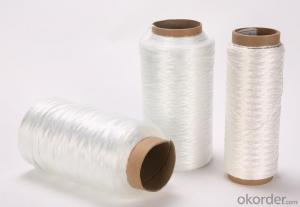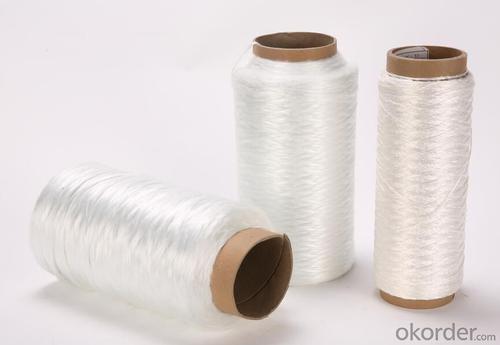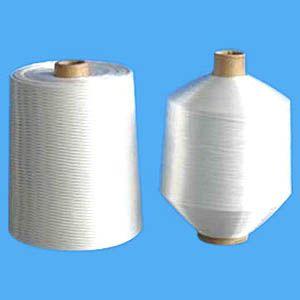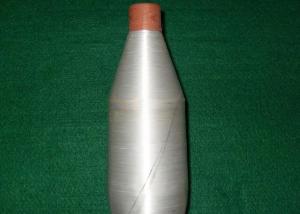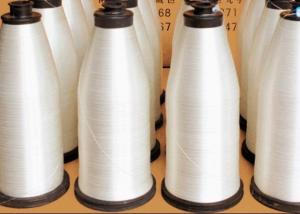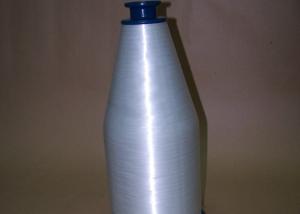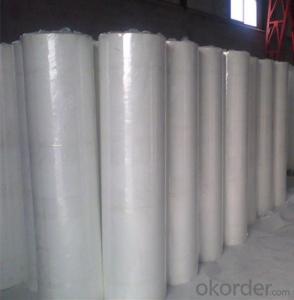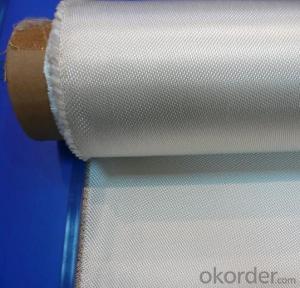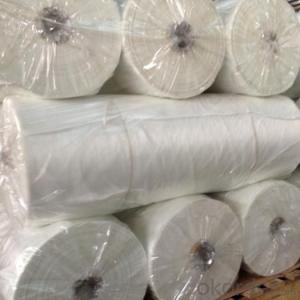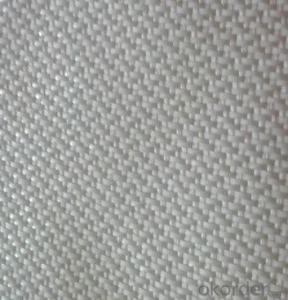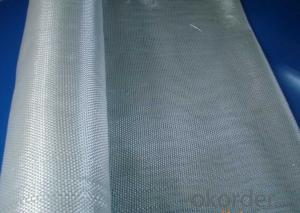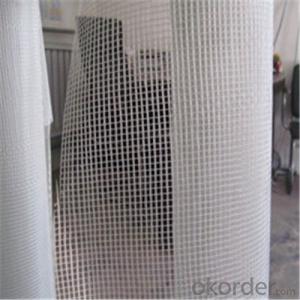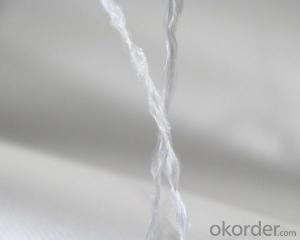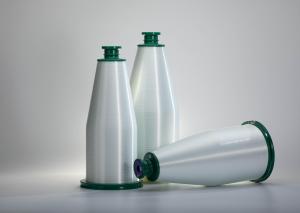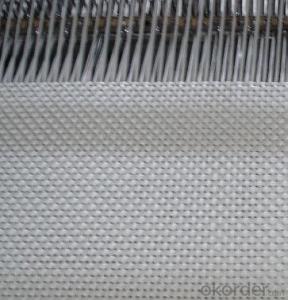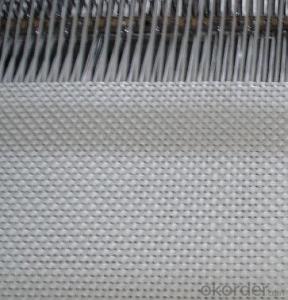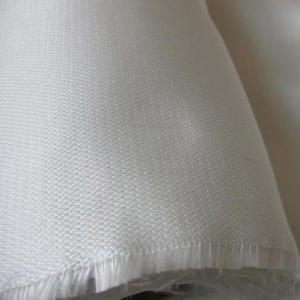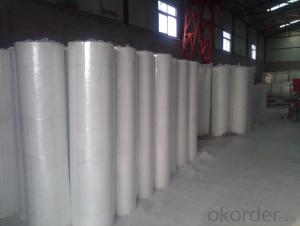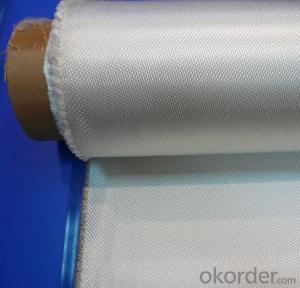Fiberglass Yarn - High Strength Non-Alkali Fiberglass Yarn
- Loading Port:
- Ningbo
- Payment Terms:
- TT OR LC
- Min Order Qty:
- 500 kg
- Supply Capability:
- 300000 kg/month
OKorder Service Pledge
OKorder Financial Service
You Might Also Like
Description: Fiberglass yarn is a fiberglass twisting yarn.Its high strength, corrosion resistance, high temperature resistant, moisture absorption, good electrical insulating performance, used in weaving, casing, mine fuse wire and cable coating layer, the windings of electric machines and appliances insulating material, various machine weaving yarn and other industrial yarn.
Features: high temperature, chemical, and abrasion resistance, fire retardant

PRICE: USD7 per kilogram
UNIT: Kilogram
MOQ: 100 KGS
Weight: 0.7kg, 2kg, 4kg
Yarn Type: E-glass
Product name: Fiberglass Yarn
Diameter: 3-9um
Linear Density: 33tex
Alkali content: Alkali free
Material: fiberglass
Surface Treatment: Vinyl Coated
Yarn Structure: Single Yarn
Supply ability: 5000 Ton/Tons per Day
Packaging: opp bag, then carton box
Lead time: 7-30 days
- Q: How does the resistance to aging of fiberglass yarn compare to other materials?
- Fiberglass yarn is widely acknowledged as having superior resistance to aging compared to numerous other materials. It is a synthetic substance made up of fine glass fibers, granting it exceptional durability and longevity. One of the primary benefits of fiberglass yarn is its ability to withstand degradation caused by various environmental elements. It exhibits high resistance to UV radiation, weathering, and corrosion, which are common factors contributing to the aging process in many materials. Consequently, fiberglass yarn can maintain its strength and integrity over long periods, establishing itself as a dependable option for diverse applications. Furthermore, fiberglass yarn possesses exceptional resistance to chemicals and moisture, further bolstering its ability to resist aging. This quality renders it suitable for use in harsh environments where exposure to corrosive agents or humid conditions is probable. In comparison to alternative materials like natural fibers (e.g., cotton or wool) or synthetic fibers (e.g., nylon or polyester), fiberglass yarn possesses a distinct advantage in terms of aging resistance. Natural fibers tend to deteriorate over time due to factors such as sunlight exposure, moisture, and insect damage, while synthetic fibers can be susceptible to UV degradation or chemical breakdown. Conversely, the distinctive composition of fiberglass yarn lends it a high level of resistance to these aging factors, enabling it to maintain its structural integrity over extended periods. In conclusion, the superiority of fiberglass yarn's resistance to aging is widely acknowledged when compared to numerous other materials. Its exceptional ability to withstand UV radiation, weathering, corrosion, chemicals, and moisture makes it a reliable choice for various applications where longevity and aging resistance are crucial.
- Q: Does fiberglass yarn have any electrical conductivity?
- Negative, fiberglass yarn lacks electrical conductivity. Fiberglass, an insulating substance composed of delicate glass fibers, possesses an exceptionally elevated electrical resistance. Consequently, it prohibits the transmission of electric current, making it a prevalent choice for ventures necessitating electrical insulation, including the production of electrical cables, circuit boards, and insulating blankets.
- Q: Can fiberglass yarn be used in acoustic insulation?
- Yes, fiberglass yarn can be used in acoustic insulation. Its high tensile strength, durability, and ability to trap and absorb sound waves make it a suitable material for acoustic insulation applications.
- Q: How can fiberglass yarn be stored to maintain its quality?
- To maintain the quality of fiberglass yarn, it is important to store it properly. Here are some tips on how to store fiberglass yarn: 1. Keep it in a dry environment: Fiberglass yarn is sensitive to moisture, so it is crucial to store it in a dry place. Moisture can lead to mold growth and weaken the yarn's integrity. Consider using a dehumidifier if the storage area is prone to high humidity. 2. Avoid exposure to direct sunlight: Prolonged exposure to sunlight can cause the yarn to degrade and lose its strength. Store fiberglass yarn away from windows or any other sources of direct sunlight to prevent damage. 3. Store in a well-ventilated space: Proper airflow is important to prevent the buildup of moisture and reduce the risk of mold or mildew growth. Ensure that the storage area is well-ventilated to maintain the quality of the yarn. 4. Use protective covers or containers: To protect fiberglass yarn from dust, dirt, and other contaminants, use protective covers or store it in sealed containers. This will also help prevent any potential damage caused by external factors. 5. Keep away from chemicals: Fiberglass yarn can be sensitive to certain chemicals and solvents. Avoid storing it near any chemicals or substances that may react with or damage the yarn. 6. Keep it away from sharp objects: Fiberglass yarn can easily get snagged or torn by sharp objects. Store it away from any items that may pose a risk of puncturing or damaging the yarn. By following these storage guidelines, you can help maintain the quality of fiberglass yarn, ensuring its longevity and usability for various applications.
- Q: Can fiberglass yarn be used for heat-resistant fabrics?
- Yes, fiberglass yarn can be used for heat-resistant fabrics.
- Q: Can fiberglass yarn be used in marine applications?
- Yes, fiberglass yarn can be used in marine applications. It is commonly used in boat building and repair due to its strength, durability, and resistance to moisture and corrosion. It is used in various marine components such as hulls, decks, and bulkheads to provide reinforcement and enhance the structural integrity of the vessel.
- Q: Is fiberglass yarn resistant to compression or crushing?
- Yes, fiberglass yarn is typically resistant to compression or crushing due to its high tensile strength and rigid nature.
- Q: Can fiberglass yarn be used in electrical cables?
- Indeed, the utilization of fiberglass yarn in electrical cables is possible. Renowned for its exceptional strength, durability, and resistance to both heat and fire, fiberglass yarn is highly suitable for serving as insulation and reinforcement within electrical cables. It is frequently employed as a crucial component in the fabrication of high-temperature cables, particularly in the aerospace, automotive, and industrial sectors, where extreme temperatures pose a challenge that demands cable integrity. Furthermore, the non-conductive nature of fiberglass yarn guarantees that it does not impede the electrical conductivity of the cables. All in all, fiberglass yarn represents a dependable and effective choice when incorporating it into electrical cables.
- Q: Can fiberglass yarn be used in the production of industrial fabrics?
- Yes, fiberglass yarn can be used in the production of industrial fabrics. Fiberglass yarn is known for its high strength, durability, and heat resistance, making it suitable for various industrial applications such as insulation, reinforcement, and filtration. Its properties make it an ideal choice for manufacturing industrial fabrics that require high performance and reliability.
- Q: How does the diameter of fiberglass yarn affect its performance?
- The diameter of fiberglass yarn plays a crucial role in determining its performance. A thinner diameter yarn typically results in a higher strength-to-weight ratio, making it ideal for applications requiring strength and durability while maintaining lightness. Thinner yarns also offer better flexibility, allowing them to be easily woven or knitted into fabrics or used for reinforcement in composites. On the other hand, thicker diameter yarns generally exhibit higher stiffness and rigidity, making them suitable for applications that require rigidity and resistance to deformation. Thicker yarns are often used in applications where structural integrity and load-bearing capacity are important, such as in construction or industrial settings. Additionally, the diameter of fiberglass yarn can also affect its thermal and electrical conductivity. Thinner yarns tend to have better thermal and electrical conductivity properties, which can be advantageous in certain applications like insulation or electrical components. In summary, the diameter of fiberglass yarn significantly impacts its performance by influencing its strength, weight, flexibility, stiffness, thermal conductivity, and electrical conductivity. The choice of yarn diameter should be carefully considered to ensure it is compatible with the specific requirements and intended application.
Send your message to us
Fiberglass Yarn - High Strength Non-Alkali Fiberglass Yarn
- Loading Port:
- Ningbo
- Payment Terms:
- TT OR LC
- Min Order Qty:
- 500 kg
- Supply Capability:
- 300000 kg/month
OKorder Service Pledge
OKorder Financial Service
Similar products
Hot products
Hot Searches
Related keywords
